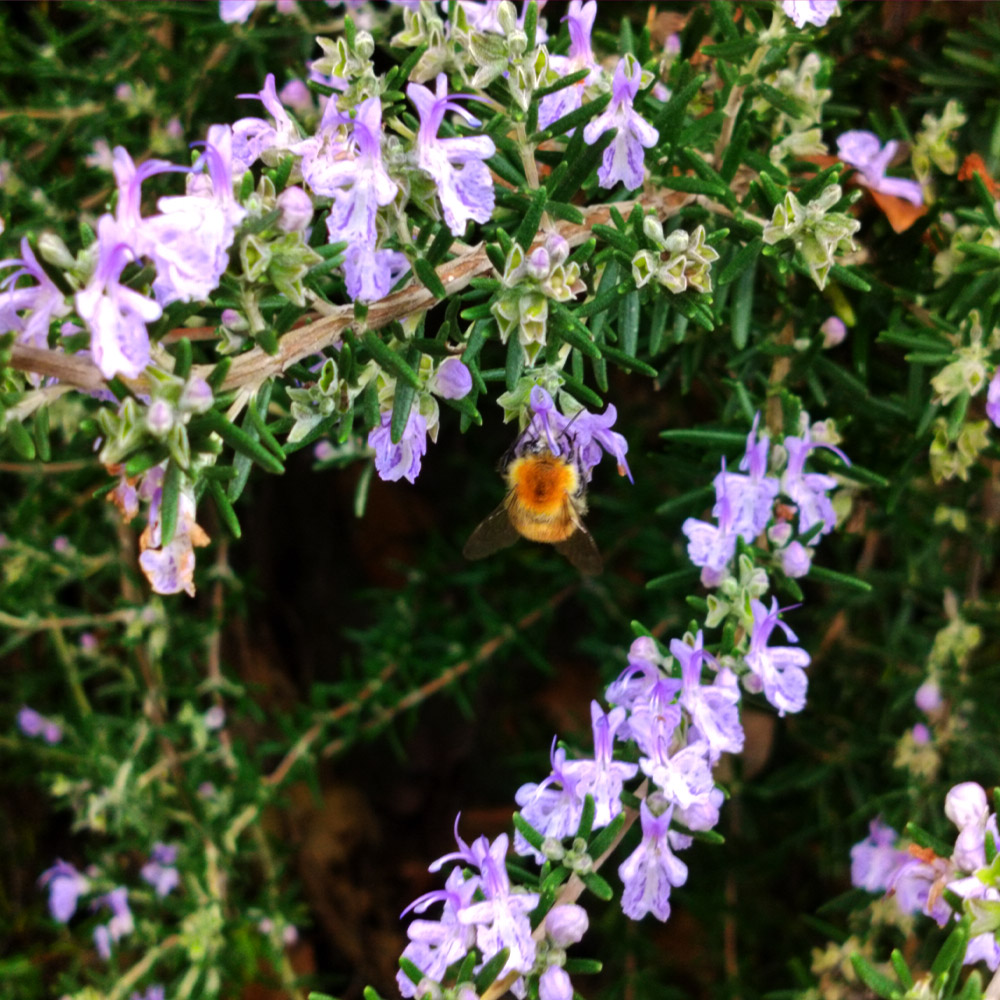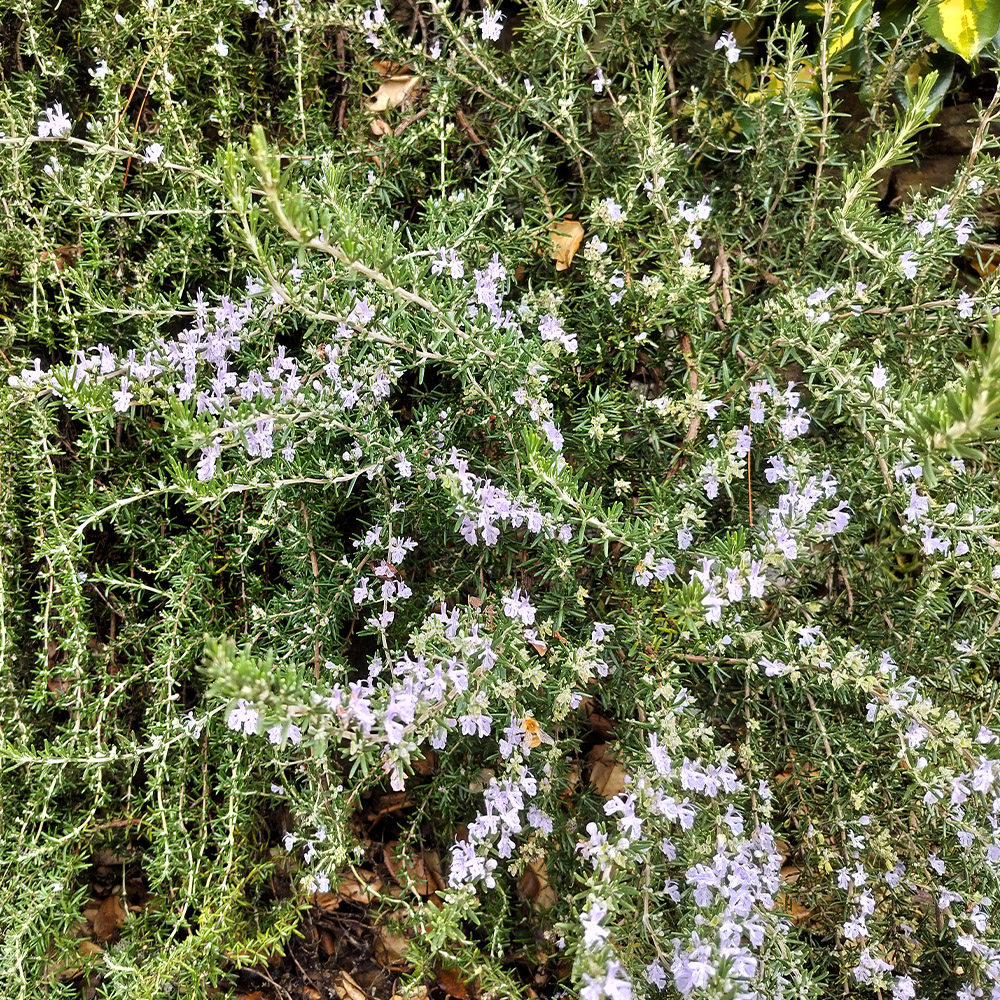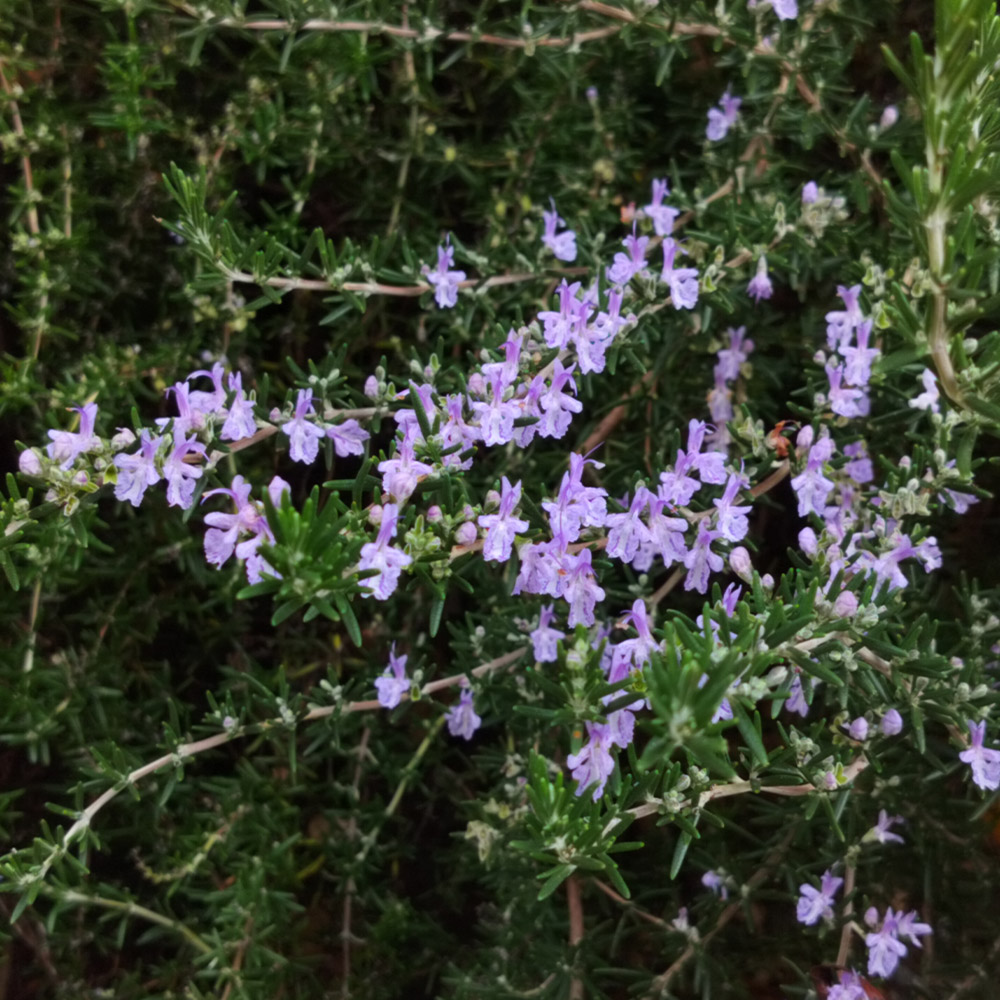No products in the cart.
Rosmarinus officinalis ‘Repens’
A cascading variation on the classic Mediterranean rosemary.
Rated 0 out of 5
0 customer reviews
4,90 € – 12,00 €Price range: 4,90 € through 12,00 €
Tags: aromatique, couvre sol, evergreen, graphique, perennial, persistant, plant, secheresse, soleil, vivace
SKU: pda188
Category: Balcony-Friendly, Bees and Butterflies, Bouquet, Culinary, Distillations, Evergreen, Fragrant, Frost Hardy, Grey Ladies, Ground Cover, Medicinal

Rosmarinus officinalis ‘Repens’
4,90 € – 12,00 €Price range: 4,90 € through 12,00 €
Rosmarinus officinalis ‘Repens’ or ‘Trailing Rosemary’ is a drought tolerant, fragrant, cascading variation on the classic Mediterranean rosemary.
Also known as Prostrate Rosemary, this variety covers the ground in ripples and undulations but is at its best when cascading over a wall or a rocky slope.
The leaves are smaller than common Rosemary but smell just as delicious.
The flowers are small and blue, appearing in the spring in Central to Northern France.
If you are a lucky one and live in the South, the flowering can begin as early as February.
👨🌾GARDENING TIPS👨🌾: Rosmarinus officinalis ‘Repens’
-
- Shearing the top encourages the side branches to spread.
- Rosemary really despises sitting in soggy soil so ensure that your soil is sandy, poor, and very well draining.
Learn more about gardening with Rosemary:
The Tale & The Botany: Rosmarinus officinalis ‘Repens’
Commonly known as rosemary, Rosmarinus officinalis is a small shrub from the Mediterranean basin belonging to the Lamiaceae family.
Beyond its many culinary and medicinal uses, it has long been believed to purify the air and ward off evil spirits, and in Mediterranean traditions it was often burned as incense.
Depending on the region and its natural habitat, Rosmarinus officinalis has developed local variations in terms of hardiness, growth habit, and flowering patterns.
Myths and Legends
The name Rosmarinus comes from the Latin ros maris or ‘dew of the sea’.
Elizabeth Kent noted in her Flora Domestica (1823), “The botanical name of this plant is compounded of two Latin words [ros marinus], signifying Sea-dew; and indeed Rosemary thrives best by the sea.
It was later called Rose of Mary or rosemary in honor of the Virgin Mary.
Rosemary water is often called ‘Queen of Hungary Water’ since it is said that Elizabeth of Poland, one of the Queens of Hungary, was the first to introduce perfume (hers a rosemary-infused alcoholate) to the 14th courts in Hungary.
And one can imagine that life was much more pleasant in the court thereafter.
The plant itself has historically been associated with remembrance, memory, and fidelity.
In Roman times, students wore springs of rosemary in their hair so that they would better remember the lessons that they learned at school.
In Shakespeare’s Hamlet, Ophelia says, :‘There’s rosemary, that’s for remembrance, pray you love, remember.’
So if ever you want to offer the gift of memory, it is here!
Floral Morphology
The plant flowers in spring and summer in temperate climates, but the plants can be in constant bloom in warm climates; flowers are white, pink, purple or deep blue.
The branches are dotted with groups of 2 to 3 flowers down its length.
Rosmarinus officinalis also has a tendency to flower outside its normal flowering season; it has been known to flower as late as early December
The plant can live as long as 35 years – I’ve known one that was older than me today – it was 40!
Rosemary has a fibrous root system- an adaptation to poor or dry soils and rocky terrain.
Other names
Trailing Rosemary
Creeping Rosemary
Prostrate Rosemary
Origin
Mediterranean
Other names:
Trailing Rosemary
Creeping Rosemary
Prostrate Rosemary
Origin:
Mediterranean
Discover more from plant d'Avenir
Subscribe to get the latest posts sent to your email.
| Weight | 0,5 kg |
|---|---|
| Container Size | 9×9 cm, 2L |
| Flowering | March, April, May, October, November |
| Soil | Dry, Well-Draining |
| Exposure | Full Sun |
| Frost Tolerance | -10°C to -15°C |
| Size | 0.3m H x 2m W |
Reviews
0
Rated 0 out of 5
0 customer reviews
5
0
4
0
3
0
2
0
1
0
Only logged in customers who have purchased this product may leave a review.
Related Products
Echinacea purpurea
A perennial with purple flowers all summer long
A perennial with purple flowers all summer long
Rated 0 out of 5
Hieracium maculatum Leopard
A native perennial with blue-green leaves and a tall yellow flower
A native perennial with blue-green leaves and a tall yellow flower
Rated 0 out of 5
Erigeron kavinskianus
A daisy-like carpet of flowers
A daisy-like carpet of flowers
Rated 0 out of 5
Melissa officinalis
A perennial plant in the mint family that is adored by bees, royal families and tea drinkers.
A perennial plant in the mint family that is adored by bees, royal families and tea drinkers.
Rated 0 out of 5
Euphorbia myrsinites
Known for its draping form of silver-gray foliage and radiant blooms.
Known for its draping form of silver-gray foliage and radiant blooms.
Rated 0 out of 5
Tanacetum densum subsp amani
A shrublet composed of soft, finely divided silvery gray-white leaves.
A shrublet composed of soft, finely divided silvery gray-white leaves.
Rated 0 out of 5
Stachys byzantina
Silky white-grey leaves and tall striking flowers
Silky white-grey leaves and tall striking flowers
Rated 0 out of 5
Vinca minor
Looping elegance and ability to form a low flowering ground cover
Looping elegance and ability to form a low flowering ground cover
Rated 0 out of 5
Glechoma hederacea
A sweet smelling ground cover, producing little blue flowers all summer long.
A sweet smelling ground cover, producing little blue flowers all summer long.
Rated 0 out of 5
Tradescantia Blushing Bride
Gorgeous blushes of pink and white that appear in the coldest nights.
Gorgeous blushes of pink and white that appear in the coldest nights.
Rated 0 out of 5
Hellebore argutifolius
Winter flowering perennial with marbled blue-green leaves
Winter flowering perennial with marbled blue-green leaves
Rated 0 out of 5
Mentha x piperita ‘Chartreuse’
A spicy mint, known for its use in the production of liqueurs and herbal teas.
A spicy mint, known for its use in the production of liqueurs and herbal teas.
Rated 0 out of 5
Delosperma cooperi
A dwarf perennial known for its vermillion colored flowers
A dwarf perennial known for its vermillion colored flowers
Rated 0 out of 5
Cerastium tomentosum var. columnae
A grey-green spreading ground cover from the mountains.
A grey-green spreading ground cover from the mountains.
Rated 0 out of 5
Trachelospermum asiaticum ‘Ogon Nishiki’
Jasmine with colorful foliage and lovely white flowers in summer
Jasmine with colorful foliage and lovely white flowers in summer
Rated 0 out of 5
Artemisia Valerie Finnis
A semi-evergreen, aromatic variation on the theme of Artemisia.
A semi-evergreen, aromatic variation on the theme of Artemisia.
Rated 0 out of 5
Sedum album
A low, multi-color ground cover.
A low, multi-color ground cover.
Rated 0 out of 5
Euphorbia cyparissias Clarice Howard
A Euphorbia that resembles a soft little cyprus tree
A Euphorbia that resembles a soft little cyprus tree
Rated 0 out of 5
recent view product
Sedum spectabile Variegatum
Luminous variegated leaves and soft white flowers
Luminous variegated leaves and soft white flowers
Rated 0 out of 5
Origanum vulgare Variegatum
A dense carpet of green and cream fragrant leaves
A dense carpet of green and cream fragrant leaves
Rated 0 out of 5
Salvia officinalis ‘Bergartten’
Salvia officinalis ‘Bergartten’ is a variety of sage that is prized for its large, round silver-blue leaves and soft blooms in the summer.
Salvia officinalis ‘Bergartten’ is a variety of sage that is prized for its large, round silver-blue leaves and soft blooms in the summer.
Rated 0 out of 5
Coreopsis verticillata ‘Zagreb’
A perennial coreopsis that forms a compact clump, covered with small golden-yellow flowers
A perennial coreopsis that forms a compact clump, covered with small golden-yellow flowers
Rated 0 out of 5
Sedum ochroleucum ‘Green Ball’
An elegant blue, low-maintenance perennial ground cover.
An elegant blue, low-maintenance perennial ground cover.
Rated 0 out of 5


















































There are no reviews yet.